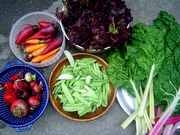

|
| Vegetable Varieties for Gardeners is a citizen science program
|
|
|
|
'Yellow Belly Black Diamond' Melons |
| |
| Sub-Category: |
Watermelon
|
| |
|
| Sub-Category 2: |
| | Description: |
Open-pollinated watermelon. Vines bear 60- to 75-pound, slightly oblong, red-fleshed, grayish-black seeded, blue-black fruit with yellow belly. Also known as 'Black Diamond Yellow Belly Strain'.
|
| Days To Maturity: |
90
|
| Seed Sources: |
|
| |
| Rating Summary |
| |
Overall: (5.0 Stars)
Taste: (4.5 Stars)
Yield: (4.5 Stars)
Ease/Reliability: (5.0 Stars) |
| |
| Reviews |
| |
Login to share your Review of Yellow Belly Black Diamond.
Number of Reviews: 2
KEY: O=Overall Rating, T=Taste, Y=Yield, E=Ease
Reviewed on 09/27/2011 by
Rayrose
- An intermediate gardener
|
 Overall Overall
 Taste Taste
 Yield Yield
 Ease Ease
|
Lexington, South Carolina, United States
Frost Free Season: More than 203 days
Soil Texture: Clay
Garden Size: Large - More than 1,600 square feet (40' x 40')
Sun Exposure: More than 8 hours per day
|
| To me this is the best of the black diamond variety, even better than
verona. High yields with a second crop. Although this melon can get
to over 60 lbs, it sizes down well, without losing texture or sweetness.
Very uniform in every way, with very few culls. Top ten melon. |
| |
|
Reviewed on 05/08/2006 by
farmerdill
- An experienced gardener
|
 Overall Overall
 Taste Taste
 Yield Yield
 Ease Ease
|
Richmond, Georgia, United States
Frost Free Season: 183 - 203 days
Soil Texture: Sand
Garden Size: Large - More than 1,600 square feet (40' x 40')
Sun Exposure: More than 8 hours per day
|
| This also called the Superior Black Diamond and indeed it does outperform the regular Black Diamond in consistancy. The most attractive feature is that the bottom which lays on the ground turns bright yellow when ripe. Great feature for those who don't trust the brown tendril/thumping method of telling when the melon is ripe. |
| |
|
|
|
|
Vegetable Varieties for Gardeners is a citizen science program, © 2004-2024, All Rights Reserved
Cornell Garden Based Learning, Cornell University College of Agriculture & Life Sciences, Horticulture Section
|






 VVfG home
VVfG home
 Taste
Taste